Business Law: Analyzing Contractual Breaches and Claiming Damages
VerifiedAdded on 2022/12/23
|10
|2401
|25
Case Study
AI Summary
This assignment presents a detailed case study in Australian business law concerning contractual disputes. The first part analyzes a scenario where a car dealer faces a breach of contract when a buyer refuses to take delivery of a car. It explores the damages the dealer can claim, including those related to the initial breach and subsequent sale of the car at a different price, referencing relevant legal principles and cases such as Carlill v Carbolic Smoke Ball Co. and Addis v Gramophone. The second part of the case study examines a situation where a university contracts with a professor, but the professor is unable to fulfill the contract due to an accident. The analysis focuses on the legal implications of the contract's frustration, referencing cases like Taylor v Caldwell to determine the liabilities and outcomes for both parties involved. The assignment thoroughly examines contract law principles, breach of contract, damages, and the discharge of contracts due to frustration, providing a comprehensive overview of legal remedies and case analysis.
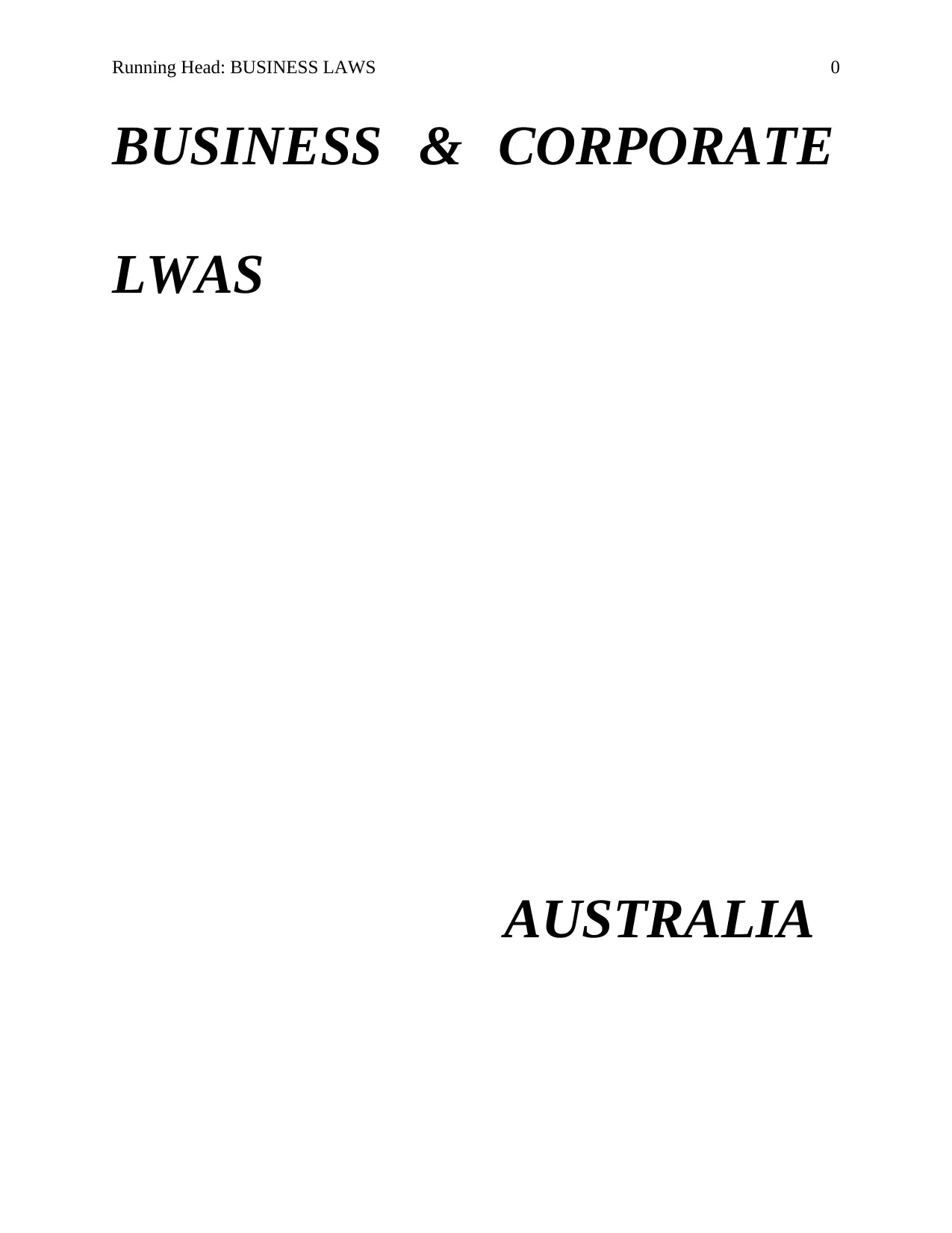
Running Head: BUSINESS LAWS 0
BUSINESS & CORPORATE
LWAS
AUSTRALIA
BUSINESS & CORPORATE
LWAS
AUSTRALIA
Paraphrase This Document
Need a fresh take? Get an instant paraphrase of this document with our AI Paraphraser
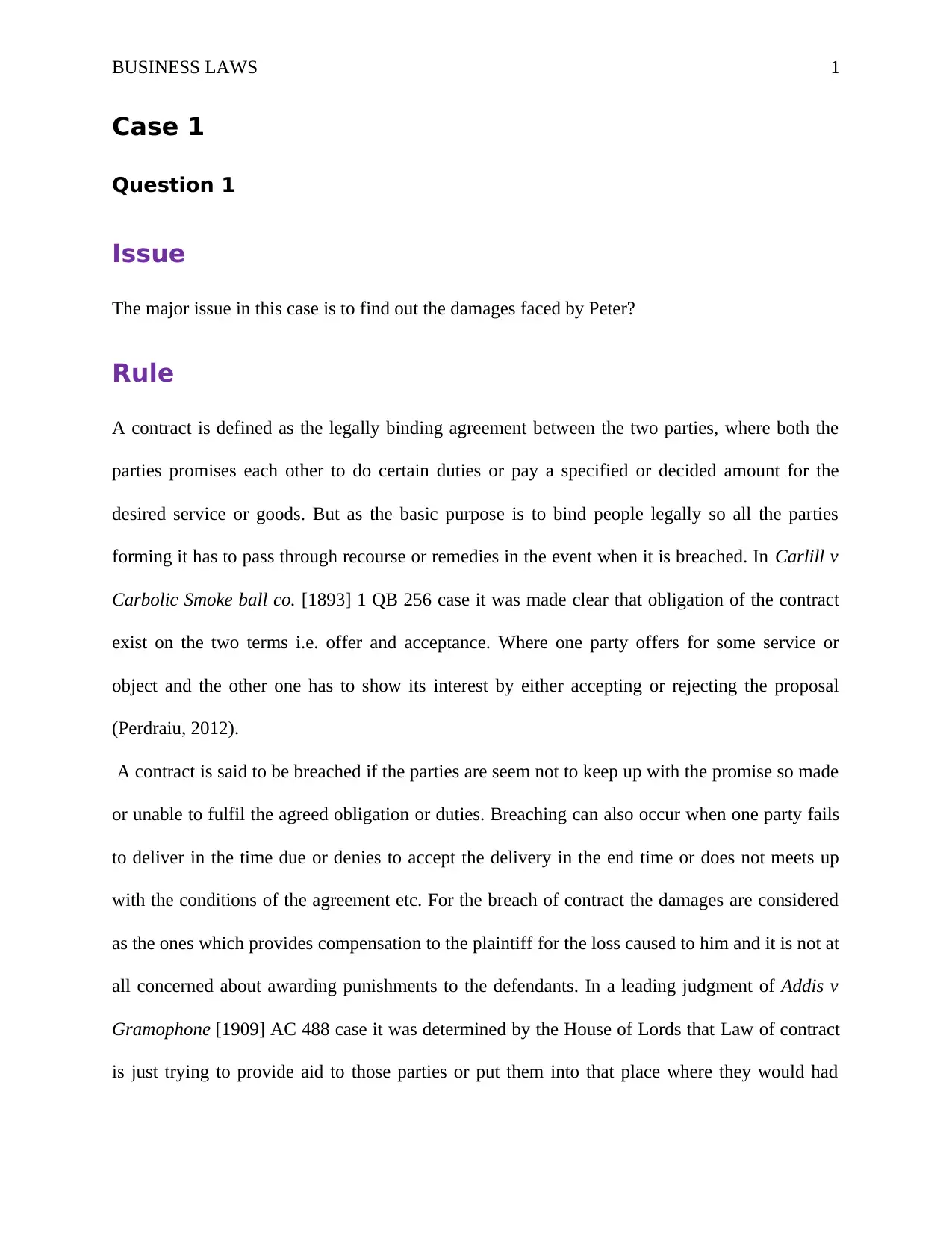
BUSINESS LAWS 1
Case 1
Question 1
Issue
The major issue in this case is to find out the damages faced by Peter?
Rule
A contract is defined as the legally binding agreement between the two parties, where both the
parties promises each other to do certain duties or pay a specified or decided amount for the
desired service or goods. But as the basic purpose is to bind people legally so all the parties
forming it has to pass through recourse or remedies in the event when it is breached. In Carlill v
Carbolic Smoke ball co. [1893] 1 QB 256 case it was made clear that obligation of the contract
exist on the two terms i.e. offer and acceptance. Where one party offers for some service or
object and the other one has to show its interest by either accepting or rejecting the proposal
(Perdraiu, 2012).
A contract is said to be breached if the parties are seem not to keep up with the promise so made
or unable to fulfil the agreed obligation or duties. Breaching can also occur when one party fails
to deliver in the time due or denies to accept the delivery in the end time or does not meets up
with the conditions of the agreement etc. For the breach of contract the damages are considered
as the ones which provides compensation to the plaintiff for the loss caused to him and it is not at
all concerned about awarding punishments to the defendants. In a leading judgment of Addis v
Gramophone [1909] AC 488 case it was determined by the House of Lords that Law of contract
is just trying to provide aid to those parties or put them into that place where they would had
Case 1
Question 1
Issue
The major issue in this case is to find out the damages faced by Peter?
Rule
A contract is defined as the legally binding agreement between the two parties, where both the
parties promises each other to do certain duties or pay a specified or decided amount for the
desired service or goods. But as the basic purpose is to bind people legally so all the parties
forming it has to pass through recourse or remedies in the event when it is breached. In Carlill v
Carbolic Smoke ball co. [1893] 1 QB 256 case it was made clear that obligation of the contract
exist on the two terms i.e. offer and acceptance. Where one party offers for some service or
object and the other one has to show its interest by either accepting or rejecting the proposal
(Perdraiu, 2012).
A contract is said to be breached if the parties are seem not to keep up with the promise so made
or unable to fulfil the agreed obligation or duties. Breaching can also occur when one party fails
to deliver in the time due or denies to accept the delivery in the end time or does not meets up
with the conditions of the agreement etc. For the breach of contract the damages are considered
as the ones which provides compensation to the plaintiff for the loss caused to him and it is not at
all concerned about awarding punishments to the defendants. In a leading judgment of Addis v
Gramophone [1909] AC 488 case it was determined by the House of Lords that Law of contract
is just trying to provide aid to those parties or put them into that place where they would had
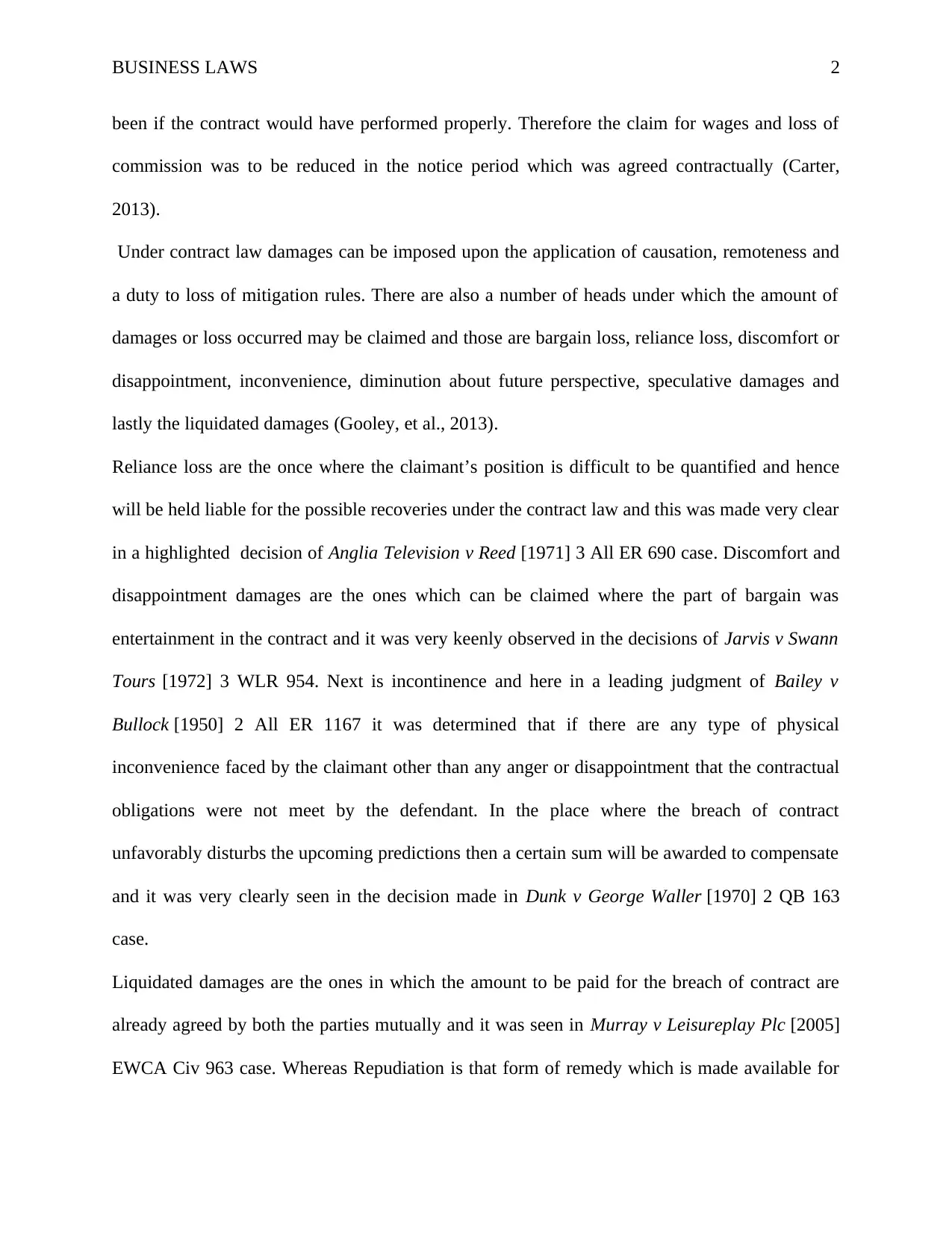
BUSINESS LAWS 2
been if the contract would have performed properly. Therefore the claim for wages and loss of
commission was to be reduced in the notice period which was agreed contractually (Carter,
2013).
Under contract law damages can be imposed upon the application of causation, remoteness and
a duty to loss of mitigation rules. There are also a number of heads under which the amount of
damages or loss occurred may be claimed and those are bargain loss, reliance loss, discomfort or
disappointment, inconvenience, diminution about future perspective, speculative damages and
lastly the liquidated damages (Gooley, et al., 2013).
Reliance loss are the once where the claimant’s position is difficult to be quantified and hence
will be held liable for the possible recoveries under the contract law and this was made very clear
in a highlighted decision of Anglia Television v Reed [1971] 3 All ER 690 case. Discomfort and
disappointment damages are the ones which can be claimed where the part of bargain was
entertainment in the contract and it was very keenly observed in the decisions of Jarvis v Swann
Tours [1972] 3 WLR 954. Next is incontinence and here in a leading judgment of Bailey v
Bullock [1950] 2 All ER 1167 it was determined that if there are any type of physical
inconvenience faced by the claimant other than any anger or disappointment that the contractual
obligations were not meet by the defendant. In the place where the breach of contract
unfavorably disturbs the upcoming predictions then a certain sum will be awarded to compensate
and it was very clearly seen in the decision made in Dunk v George Waller [1970] 2 QB 163
case.
Liquidated damages are the ones in which the amount to be paid for the breach of contract are
already agreed by both the parties mutually and it was seen in Murray v Leisureplay Plc [2005]
EWCA Civ 963 case. Whereas Repudiation is that form of remedy which is made available for
been if the contract would have performed properly. Therefore the claim for wages and loss of
commission was to be reduced in the notice period which was agreed contractually (Carter,
2013).
Under contract law damages can be imposed upon the application of causation, remoteness and
a duty to loss of mitigation rules. There are also a number of heads under which the amount of
damages or loss occurred may be claimed and those are bargain loss, reliance loss, discomfort or
disappointment, inconvenience, diminution about future perspective, speculative damages and
lastly the liquidated damages (Gooley, et al., 2013).
Reliance loss are the once where the claimant’s position is difficult to be quantified and hence
will be held liable for the possible recoveries under the contract law and this was made very clear
in a highlighted decision of Anglia Television v Reed [1971] 3 All ER 690 case. Discomfort and
disappointment damages are the ones which can be claimed where the part of bargain was
entertainment in the contract and it was very keenly observed in the decisions of Jarvis v Swann
Tours [1972] 3 WLR 954. Next is incontinence and here in a leading judgment of Bailey v
Bullock [1950] 2 All ER 1167 it was determined that if there are any type of physical
inconvenience faced by the claimant other than any anger or disappointment that the contractual
obligations were not meet by the defendant. In the place where the breach of contract
unfavorably disturbs the upcoming predictions then a certain sum will be awarded to compensate
and it was very clearly seen in the decision made in Dunk v George Waller [1970] 2 QB 163
case.
Liquidated damages are the ones in which the amount to be paid for the breach of contract are
already agreed by both the parties mutually and it was seen in Murray v Leisureplay Plc [2005]
EWCA Civ 963 case. Whereas Repudiation is that form of remedy which is made available for
⊘ This is a preview!⊘
Do you want full access?
Subscribe today to unlock all pages.

Trusted by 1+ million students worldwide
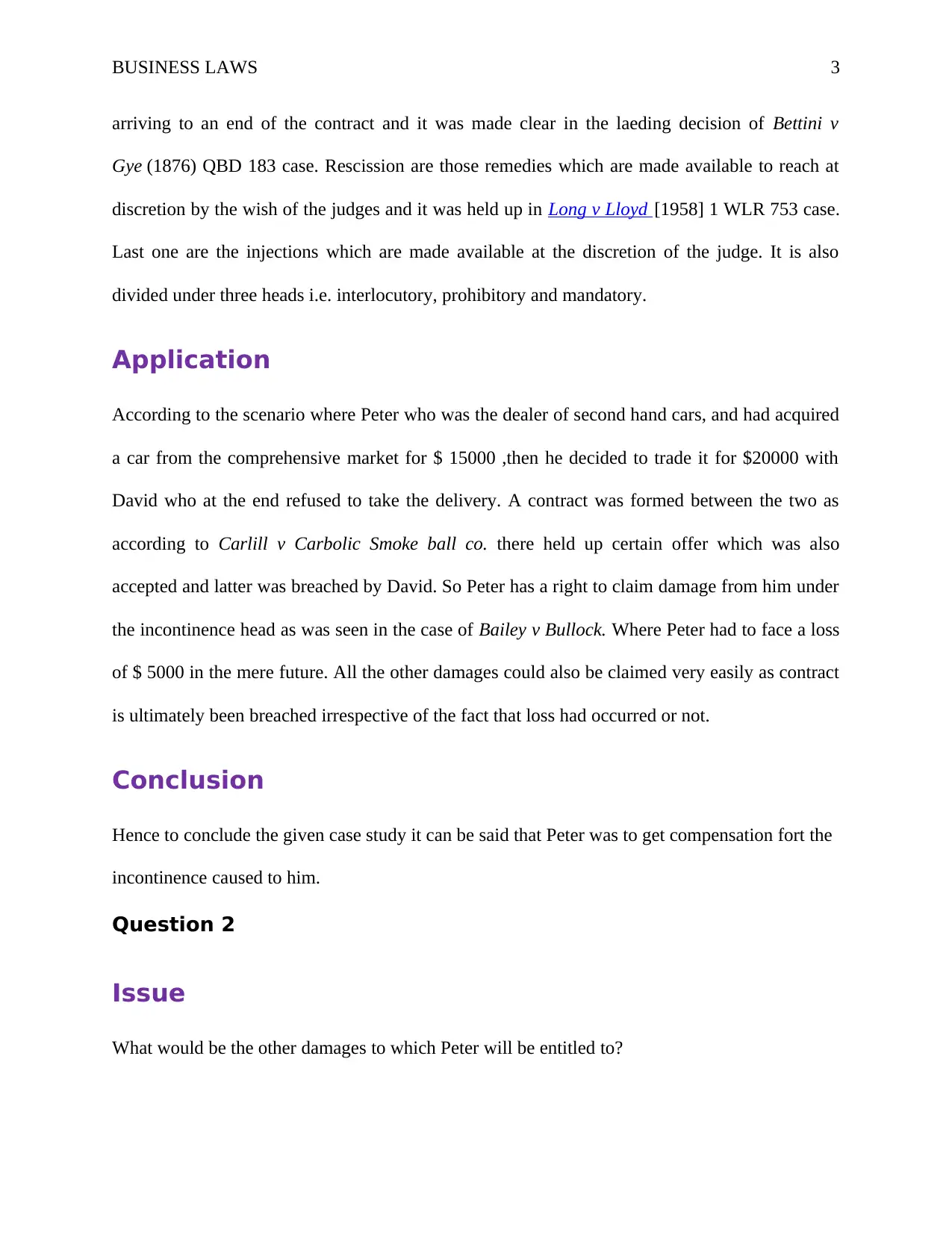
BUSINESS LAWS 3
arriving to an end of the contract and it was made clear in the laeding decision of Bettini v
Gye (1876) QBD 183 case. Rescission are those remedies which are made available to reach at
discretion by the wish of the judges and it was held up in Long v Lloyd [1958] 1 WLR 753 case.
Last one are the injections which are made available at the discretion of the judge. It is also
divided under three heads i.e. interlocutory, prohibitory and mandatory.
Application
According to the scenario where Peter who was the dealer of second hand cars, and had acquired
a car from the comprehensive market for $ 15000 ,then he decided to trade it for $20000 with
David who at the end refused to take the delivery. A contract was formed between the two as
according to Carlill v Carbolic Smoke ball co. there held up certain offer which was also
accepted and latter was breached by David. So Peter has a right to claim damage from him under
the incontinence head as was seen in the case of Bailey v Bullock. Where Peter had to face a loss
of $ 5000 in the mere future. All the other damages could also be claimed very easily as contract
is ultimately been breached irrespective of the fact that loss had occurred or not.
Conclusion
Hence to conclude the given case study it can be said that Peter was to get compensation fort the
incontinence caused to him.
Question 2
Issue
What would be the other damages to which Peter will be entitled to?
arriving to an end of the contract and it was made clear in the laeding decision of Bettini v
Gye (1876) QBD 183 case. Rescission are those remedies which are made available to reach at
discretion by the wish of the judges and it was held up in Long v Lloyd [1958] 1 WLR 753 case.
Last one are the injections which are made available at the discretion of the judge. It is also
divided under three heads i.e. interlocutory, prohibitory and mandatory.
Application
According to the scenario where Peter who was the dealer of second hand cars, and had acquired
a car from the comprehensive market for $ 15000 ,then he decided to trade it for $20000 with
David who at the end refused to take the delivery. A contract was formed between the two as
according to Carlill v Carbolic Smoke ball co. there held up certain offer which was also
accepted and latter was breached by David. So Peter has a right to claim damage from him under
the incontinence head as was seen in the case of Bailey v Bullock. Where Peter had to face a loss
of $ 5000 in the mere future. All the other damages could also be claimed very easily as contract
is ultimately been breached irrespective of the fact that loss had occurred or not.
Conclusion
Hence to conclude the given case study it can be said that Peter was to get compensation fort the
incontinence caused to him.
Question 2
Issue
What would be the other damages to which Peter will be entitled to?
Paraphrase This Document
Need a fresh take? Get an instant paraphrase of this document with our AI Paraphraser
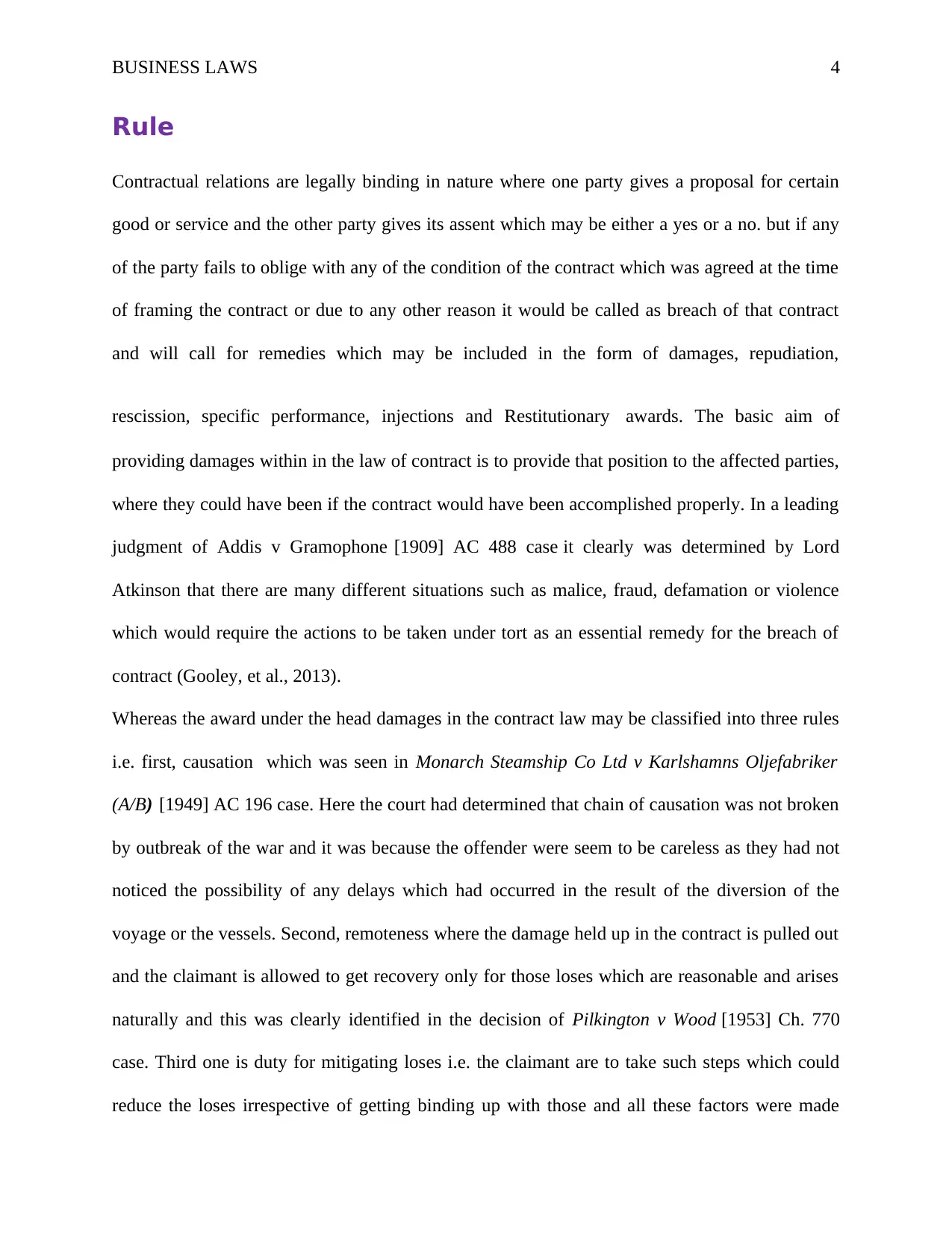
BUSINESS LAWS 4
Rule
Contractual relations are legally binding in nature where one party gives a proposal for certain
good or service and the other party gives its assent which may be either a yes or a no. but if any
of the party fails to oblige with any of the condition of the contract which was agreed at the time
of framing the contract or due to any other reason it would be called as breach of that contract
and will call for remedies which may be included in the form of damages, repudiation,
rescission, specific performance, injections and Restitutionary awards. The basic aim of
providing damages within in the law of contract is to provide that position to the affected parties,
where they could have been if the contract would have been accomplished properly. In a leading
judgment of Addis v Gramophone [1909] AC 488 case it clearly was determined by Lord
Atkinson that there are many different situations such as malice, fraud, defamation or violence
which would require the actions to be taken under tort as an essential remedy for the breach of
contract (Gooley, et al., 2013).
Whereas the award under the head damages in the contract law may be classified into three rules
i.e. first, causation which was seen in Monarch Steamship Co Ltd v Karlshamns Oljefabriker
(A/B) [1949] AC 196 case. Here the court had determined that chain of causation was not broken
by outbreak of the war and it was because the offender were seem to be careless as they had not
noticed the possibility of any delays which had occurred in the result of the diversion of the
voyage or the vessels. Second, remoteness where the damage held up in the contract is pulled out
and the claimant is allowed to get recovery only for those loses which are reasonable and arises
naturally and this was clearly identified in the decision of Pilkington v Wood [1953] Ch. 770
case. Third one is duty for mitigating loses i.e. the claimant are to take such steps which could
reduce the loses irrespective of getting binding up with those and all these factors were made
Rule
Contractual relations are legally binding in nature where one party gives a proposal for certain
good or service and the other party gives its assent which may be either a yes or a no. but if any
of the party fails to oblige with any of the condition of the contract which was agreed at the time
of framing the contract or due to any other reason it would be called as breach of that contract
and will call for remedies which may be included in the form of damages, repudiation,
rescission, specific performance, injections and Restitutionary awards. The basic aim of
providing damages within in the law of contract is to provide that position to the affected parties,
where they could have been if the contract would have been accomplished properly. In a leading
judgment of Addis v Gramophone [1909] AC 488 case it clearly was determined by Lord
Atkinson that there are many different situations such as malice, fraud, defamation or violence
which would require the actions to be taken under tort as an essential remedy for the breach of
contract (Gooley, et al., 2013).
Whereas the award under the head damages in the contract law may be classified into three rules
i.e. first, causation which was seen in Monarch Steamship Co Ltd v Karlshamns Oljefabriker
(A/B) [1949] AC 196 case. Here the court had determined that chain of causation was not broken
by outbreak of the war and it was because the offender were seem to be careless as they had not
noticed the possibility of any delays which had occurred in the result of the diversion of the
voyage or the vessels. Second, remoteness where the damage held up in the contract is pulled out
and the claimant is allowed to get recovery only for those loses which are reasonable and arises
naturally and this was clearly identified in the decision of Pilkington v Wood [1953] Ch. 770
case. Third one is duty for mitigating loses i.e. the claimant are to take such steps which could
reduce the loses irrespective of getting binding up with those and all these factors were made
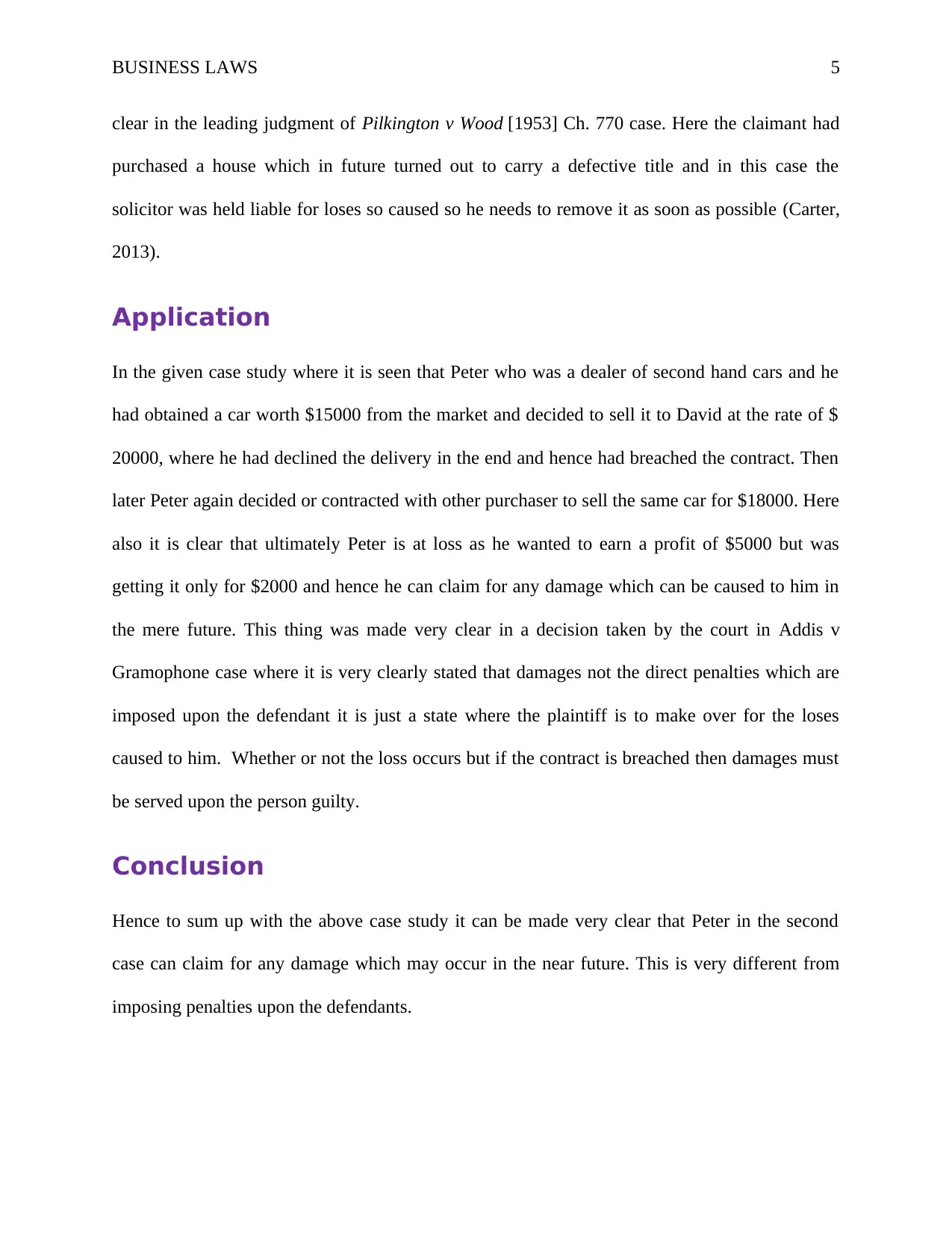
BUSINESS LAWS 5
clear in the leading judgment of Pilkington v Wood [1953] Ch. 770 case. Here the claimant had
purchased a house which in future turned out to carry a defective title and in this case the
solicitor was held liable for loses so caused so he needs to remove it as soon as possible (Carter,
2013).
Application
In the given case study where it is seen that Peter who was a dealer of second hand cars and he
had obtained a car worth $15000 from the market and decided to sell it to David at the rate of $
20000, where he had declined the delivery in the end and hence had breached the contract. Then
later Peter again decided or contracted with other purchaser to sell the same car for $18000. Here
also it is clear that ultimately Peter is at loss as he wanted to earn a profit of $5000 but was
getting it only for $2000 and hence he can claim for any damage which can be caused to him in
the mere future. This thing was made very clear in a decision taken by the court in Addis v
Gramophone case where it is very clearly stated that damages not the direct penalties which are
imposed upon the defendant it is just a state where the plaintiff is to make over for the loses
caused to him. Whether or not the loss occurs but if the contract is breached then damages must
be served upon the person guilty.
Conclusion
Hence to sum up with the above case study it can be made very clear that Peter in the second
case can claim for any damage which may occur in the near future. This is very different from
imposing penalties upon the defendants.
clear in the leading judgment of Pilkington v Wood [1953] Ch. 770 case. Here the claimant had
purchased a house which in future turned out to carry a defective title and in this case the
solicitor was held liable for loses so caused so he needs to remove it as soon as possible (Carter,
2013).
Application
In the given case study where it is seen that Peter who was a dealer of second hand cars and he
had obtained a car worth $15000 from the market and decided to sell it to David at the rate of $
20000, where he had declined the delivery in the end and hence had breached the contract. Then
later Peter again decided or contracted with other purchaser to sell the same car for $18000. Here
also it is clear that ultimately Peter is at loss as he wanted to earn a profit of $5000 but was
getting it only for $2000 and hence he can claim for any damage which can be caused to him in
the mere future. This thing was made very clear in a decision taken by the court in Addis v
Gramophone case where it is very clearly stated that damages not the direct penalties which are
imposed upon the defendant it is just a state where the plaintiff is to make over for the loses
caused to him. Whether or not the loss occurs but if the contract is breached then damages must
be served upon the person guilty.
Conclusion
Hence to sum up with the above case study it can be made very clear that Peter in the second
case can claim for any damage which may occur in the near future. This is very different from
imposing penalties upon the defendants.
⊘ This is a preview!⊘
Do you want full access?
Subscribe today to unlock all pages.

Trusted by 1+ million students worldwide
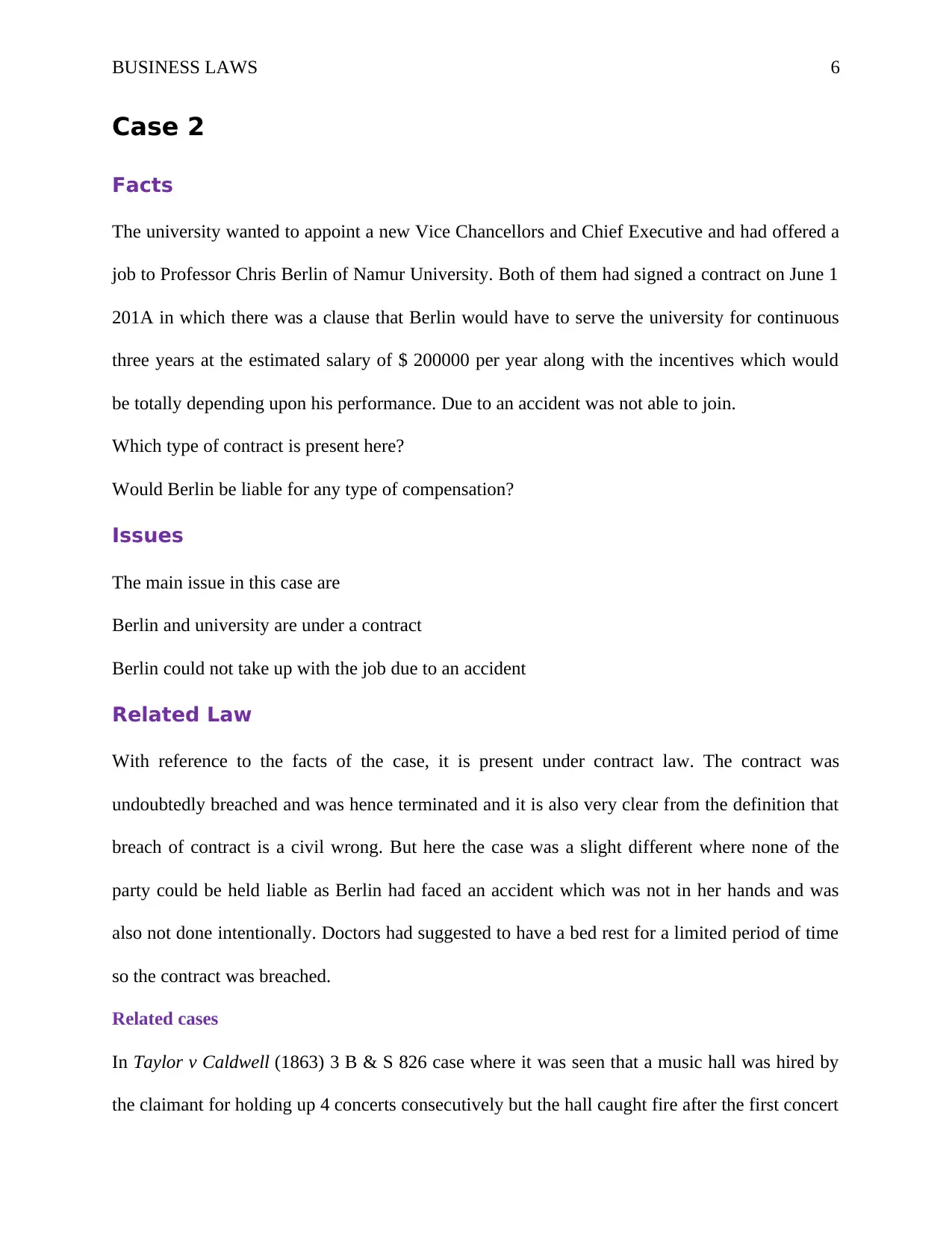
BUSINESS LAWS 6
Case 2
Facts
The university wanted to appoint a new Vice Chancellors and Chief Executive and had offered a
job to Professor Chris Berlin of Namur University. Both of them had signed a contract on June 1
201A in which there was a clause that Berlin would have to serve the university for continuous
three years at the estimated salary of $ 200000 per year along with the incentives which would
be totally depending upon his performance. Due to an accident was not able to join.
Which type of contract is present here?
Would Berlin be liable for any type of compensation?
Issues
The main issue in this case are
Berlin and university are under a contract
Berlin could not take up with the job due to an accident
Related Law
With reference to the facts of the case, it is present under contract law. The contract was
undoubtedly breached and was hence terminated and it is also very clear from the definition that
breach of contract is a civil wrong. But here the case was a slight different where none of the
party could be held liable as Berlin had faced an accident which was not in her hands and was
also not done intentionally. Doctors had suggested to have a bed rest for a limited period of time
so the contract was breached.
Related cases
In Taylor v Caldwell (1863) 3 B & S 826 case where it was seen that a music hall was hired by
the claimant for holding up 4 concerts consecutively but the hall caught fire after the first concert
Case 2
Facts
The university wanted to appoint a new Vice Chancellors and Chief Executive and had offered a
job to Professor Chris Berlin of Namur University. Both of them had signed a contract on June 1
201A in which there was a clause that Berlin would have to serve the university for continuous
three years at the estimated salary of $ 200000 per year along with the incentives which would
be totally depending upon his performance. Due to an accident was not able to join.
Which type of contract is present here?
Would Berlin be liable for any type of compensation?
Issues
The main issue in this case are
Berlin and university are under a contract
Berlin could not take up with the job due to an accident
Related Law
With reference to the facts of the case, it is present under contract law. The contract was
undoubtedly breached and was hence terminated and it is also very clear from the definition that
breach of contract is a civil wrong. But here the case was a slight different where none of the
party could be held liable as Berlin had faced an accident which was not in her hands and was
also not done intentionally. Doctors had suggested to have a bed rest for a limited period of time
so the contract was breached.
Related cases
In Taylor v Caldwell (1863) 3 B & S 826 case where it was seen that a music hall was hired by
the claimant for holding up 4 concerts consecutively but the hall caught fire after the first concert
Paraphrase This Document
Need a fresh take? Get an instant paraphrase of this document with our AI Paraphraser
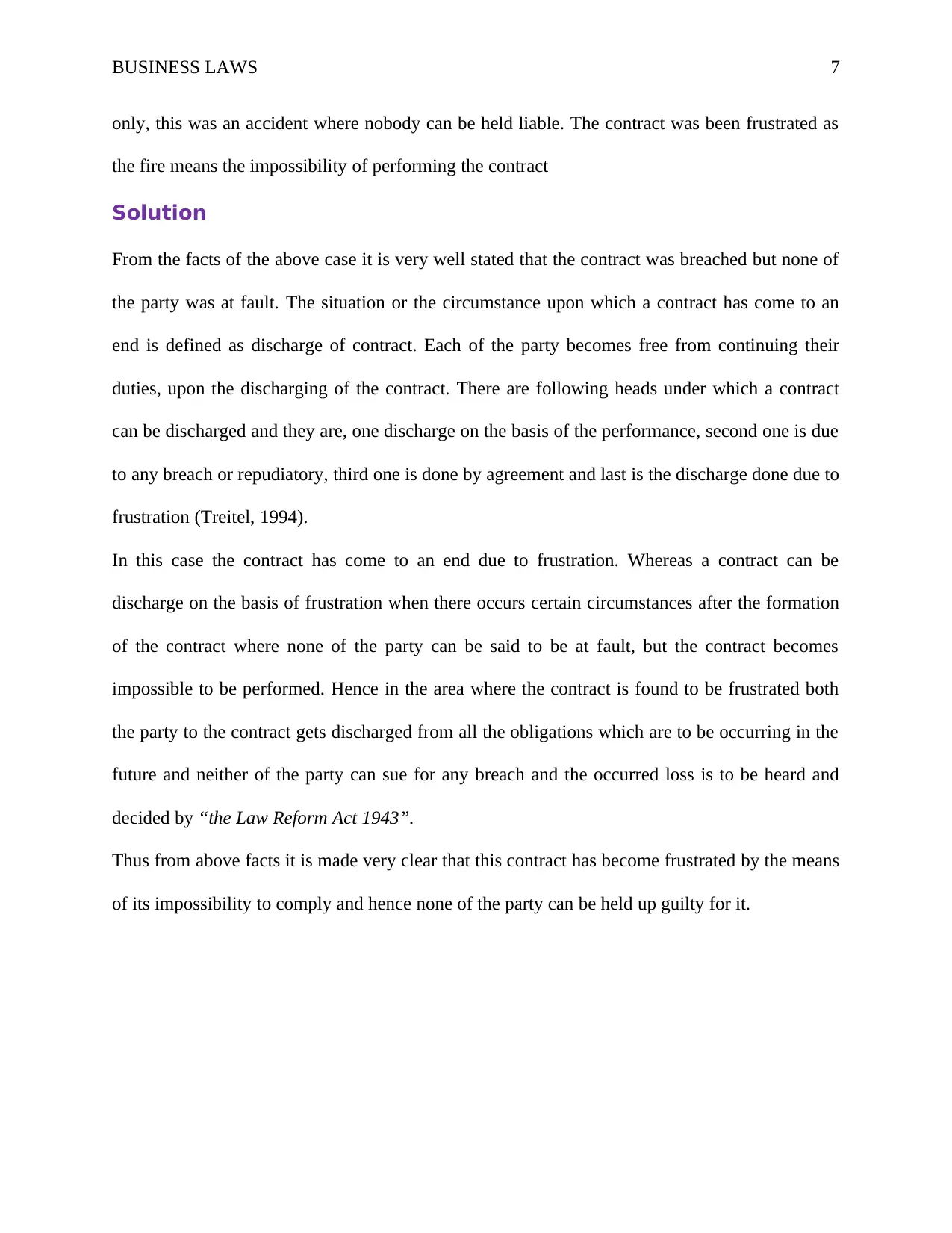
BUSINESS LAWS 7
only, this was an accident where nobody can be held liable. The contract was been frustrated as
the fire means the impossibility of performing the contract
Solution
From the facts of the above case it is very well stated that the contract was breached but none of
the party was at fault. The situation or the circumstance upon which a contract has come to an
end is defined as discharge of contract. Each of the party becomes free from continuing their
duties, upon the discharging of the contract. There are following heads under which a contract
can be discharged and they are, one discharge on the basis of the performance, second one is due
to any breach or repudiatory, third one is done by agreement and last is the discharge done due to
frustration (Treitel, 1994).
In this case the contract has come to an end due to frustration. Whereas a contract can be
discharge on the basis of frustration when there occurs certain circumstances after the formation
of the contract where none of the party can be said to be at fault, but the contract becomes
impossible to be performed. Hence in the area where the contract is found to be frustrated both
the party to the contract gets discharged from all the obligations which are to be occurring in the
future and neither of the party can sue for any breach and the occurred loss is to be heard and
decided by “the Law Reform Act 1943”.
Thus from above facts it is made very clear that this contract has become frustrated by the means
of its impossibility to comply and hence none of the party can be held up guilty for it.
only, this was an accident where nobody can be held liable. The contract was been frustrated as
the fire means the impossibility of performing the contract
Solution
From the facts of the above case it is very well stated that the contract was breached but none of
the party was at fault. The situation or the circumstance upon which a contract has come to an
end is defined as discharge of contract. Each of the party becomes free from continuing their
duties, upon the discharging of the contract. There are following heads under which a contract
can be discharged and they are, one discharge on the basis of the performance, second one is due
to any breach or repudiatory, third one is done by agreement and last is the discharge done due to
frustration (Treitel, 1994).
In this case the contract has come to an end due to frustration. Whereas a contract can be
discharge on the basis of frustration when there occurs certain circumstances after the formation
of the contract where none of the party can be said to be at fault, but the contract becomes
impossible to be performed. Hence in the area where the contract is found to be frustrated both
the party to the contract gets discharged from all the obligations which are to be occurring in the
future and neither of the party can sue for any breach and the occurred loss is to be heard and
decided by “the Law Reform Act 1943”.
Thus from above facts it is made very clear that this contract has become frustrated by the means
of its impossibility to comply and hence none of the party can be held up guilty for it.
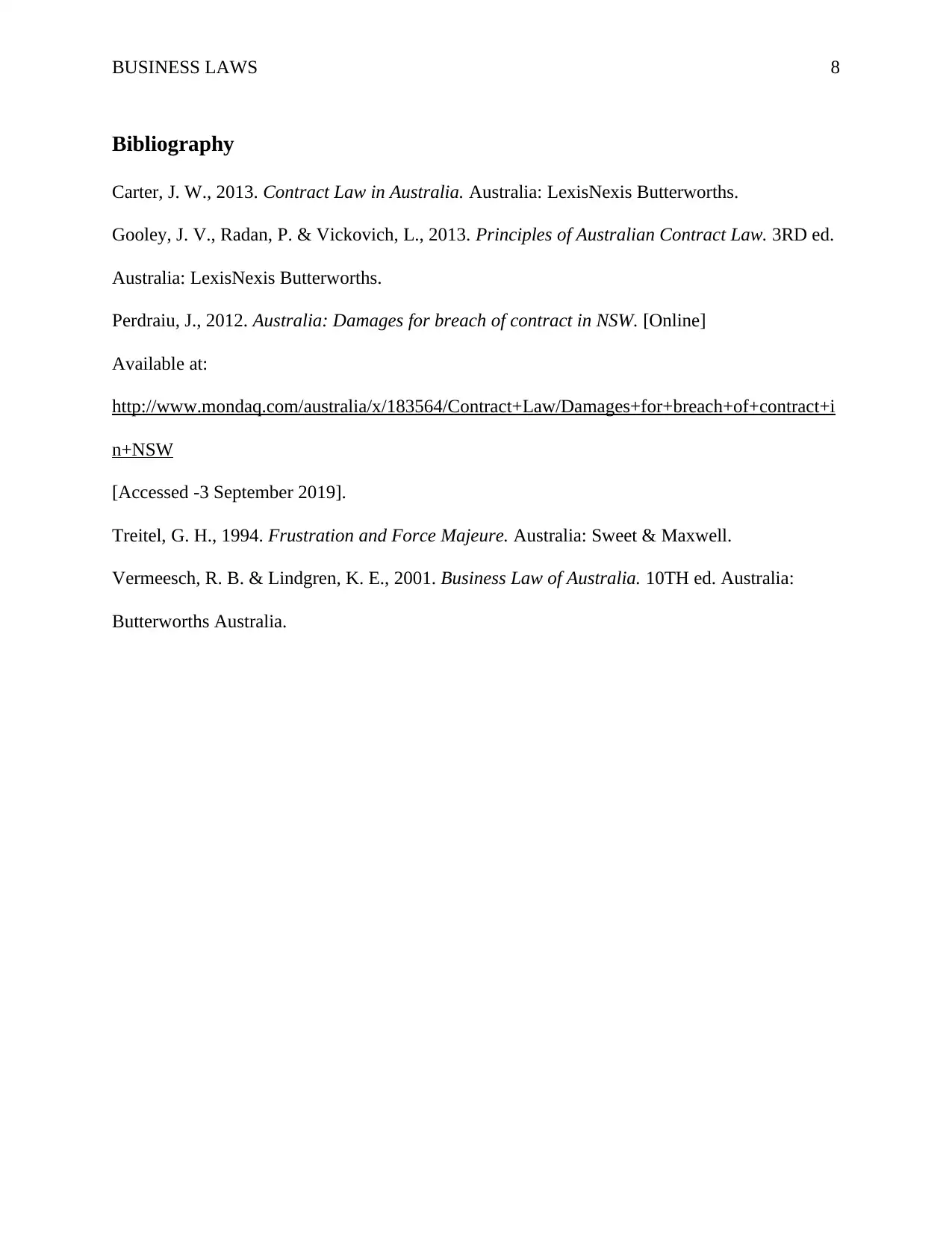
BUSINESS LAWS 8
Bibliography
Carter, J. W., 2013. Contract Law in Australia. Australia: LexisNexis Butterworths.
Gooley, J. V., Radan, P. & Vickovich, L., 2013. Principles of Australian Contract Law. 3RD ed.
Australia: LexisNexis Butterworths.
Perdraiu, J., 2012. Australia: Damages for breach of contract in NSW. [Online]
Available at:
http://www.mondaq.com/australia/x/183564/Contract+Law/Damages+for+breach+of+contract+i
n+NSW
[Accessed -3 September 2019].
Treitel, G. H., 1994. Frustration and Force Majeure. Australia: Sweet & Maxwell.
Vermeesch, R. B. & Lindgren, K. E., 2001. Business Law of Australia. 10TH ed. Australia:
Butterworths Australia.
Bibliography
Carter, J. W., 2013. Contract Law in Australia. Australia: LexisNexis Butterworths.
Gooley, J. V., Radan, P. & Vickovich, L., 2013. Principles of Australian Contract Law. 3RD ed.
Australia: LexisNexis Butterworths.
Perdraiu, J., 2012. Australia: Damages for breach of contract in NSW. [Online]
Available at:
http://www.mondaq.com/australia/x/183564/Contract+Law/Damages+for+breach+of+contract+i
n+NSW
[Accessed -3 September 2019].
Treitel, G. H., 1994. Frustration and Force Majeure. Australia: Sweet & Maxwell.
Vermeesch, R. B. & Lindgren, K. E., 2001. Business Law of Australia. 10TH ed. Australia:
Butterworths Australia.
⊘ This is a preview!⊘
Do you want full access?
Subscribe today to unlock all pages.

Trusted by 1+ million students worldwide

BUSINESS LAWS 9
1 out of 10
Related Documents
Your All-in-One AI-Powered Toolkit for Academic Success.
+13062052269
info@desklib.com
Available 24*7 on WhatsApp / Email
![[object Object]](/_next/static/media/star-bottom.7253800d.svg)
Unlock your academic potential
Copyright © 2020–2026 A2Z Services. All Rights Reserved. Developed and managed by ZUCOL.





